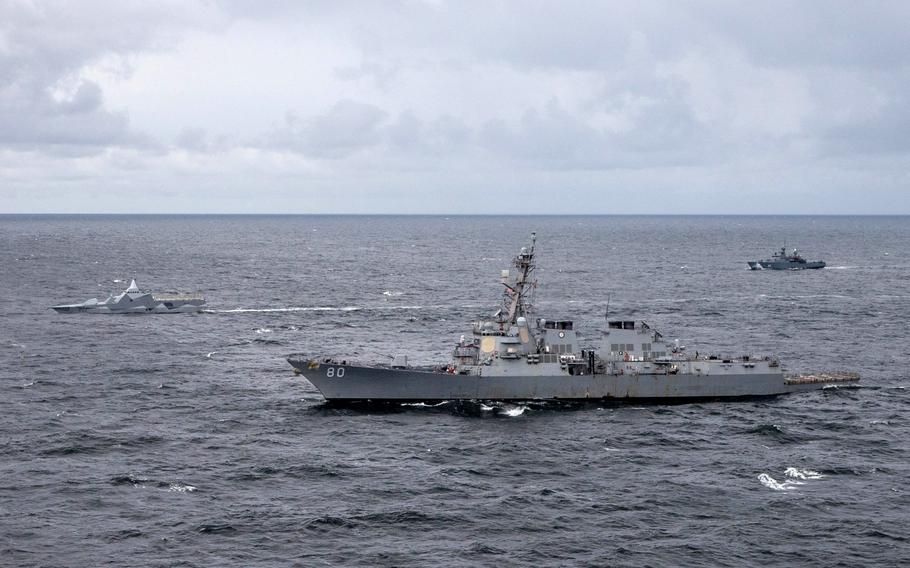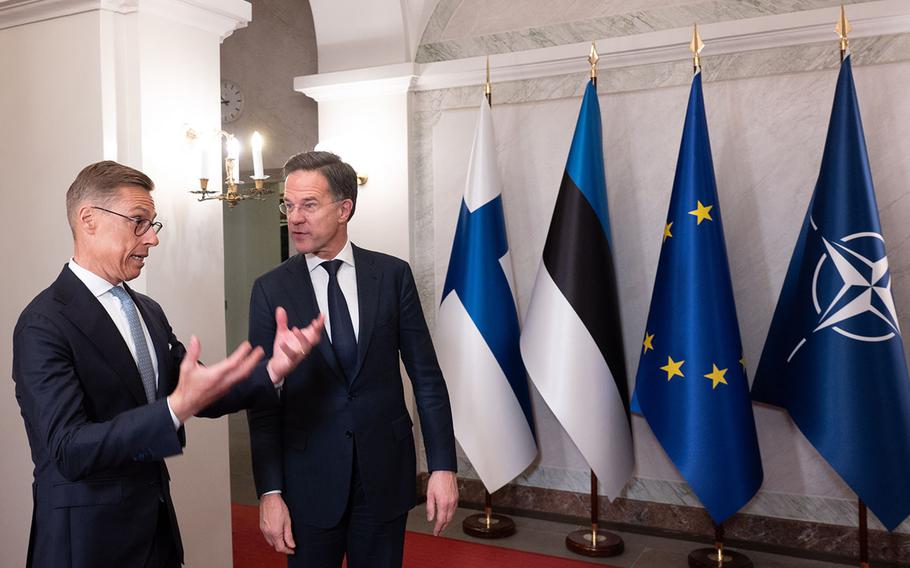
Swedish corvette HSwMS Karlstad, the U.S. destroyer USS Roosevelt and the Finnish minelayer FNS Uusimaa, from left, in the Baltic Sea in August 2023. NATO launched a new mission Jan. 14, 2025, that will enhance military capabilities in the Baltic Sea as concerns rise over suspected Russian sabotage of underwater cables. (Elexia Morelos/U.S. Navy)
STUTTGART, Germany — NATO launched a new Baltic Sea mission Tuesday that will add military capabilities into the strategic waterway as concerns over suspected Russian sabotage and aggression in the area ratchet up.
Dubbed Baltic Sentry, the effort brings together naval surveillance drones, warships, submarines and aircraft. It’s aimed at better tracking Russia’s so-called shadow fleet of ships, which are believed to have been involved in the damaging of critical undersea cables, allies said.
The additions “will deliver focused deterrence throughout the Baltic Sea and counter destabilizing acts,” U.S. Army Gen. Christopher Cavoli, NATO supreme allied commander Europe, said in a statement Tuesday.
The announcement of the alliance’s Baltic initiative coincided with a meeting in Helsinki on Tuesday involving NATO Secretary-General Mark Rutte and several heads of state.
The summit centered on how to more effectively counter suspected Russian threats to undersea infrastructure that enables everything from energy transmission to internet traffic and financial transactions.
The most recent incident occurred Dec. 25, when cables connecting Estonia and Finland were damaged. In November, a cable connecting Lithuania and Sweden was damaged, as was another connecting Germany and Finland.
While investigations are underway, ships linked to Russia are considered the main suspects. U.S. and allied military officials have long been concerned about vulnerabilities to undersea infrastructure in the Baltic and beyond.
Russia is accused of maintaining a large “shadow fleet” of old oil tankers with opaque ownership to circumvent international sanctions and carry out instances of sabotage.
Submerged cables are a linchpin to the global economy, securing 95% of internet traffic and enabling an estimated $10 trillion worth of financial transactions daily, Rutte said at the summit.
Finland’s response to the most recent incident could serve as a model, Rutte said. While the November cable destruction had caught allies off guard, Finnish authorities boarded and seized the vessel suspected in the Christmas Day sabotage.
“Ship captains must understand that potential threats to our infrastructure will have consequences, including possible boarding, impounding and arrest,” Rutte said.

NATO Secretary-General Mark Rutte, right, with Finnish President Alexander Stubb in Helsinki, Finland, on Jan. 14, 2025. The alliance launched a new mission Tuesday that will add more military capabilities in the Baltic Sea as concerns rise over suspected Russian sabotage and aggression. (NATO)
NATO coordination with national law enforcement should improve overall deterrence, he added.
Still, Russia’s broader hybrid warfare campaign in Europe has left countries struggling to decide how best to counter a range of aggressive moves.
U.S. and allied military officials have warned that Russian efforts to hit inside Europe in surprising ways have gotten more brazen over the past year.
“We have seen elements of a campaign to destabilize our societies through cyberattacks, assassination attempts and sabotage,” Rutte said.
About 150 cases of Kremlin-backed hybrid operations on NATO members’ territory have occurred since Russia launched its full-scale invasion of Ukraine in February 2022, the Helsinki Commission, an independent U.S. government agency, said in a report last month.
“Russia is simultaneously executing a shadow war on NATO to destabilize, distress, and deter the transatlantic alliance from its staunch support of Ukrainian sovereignty,” the report said.
In July, Russian sabotage was suspected when a package caught fire at a DHL logistics center in the eastern German city of Leipzig before being loaded onto a cargo plane. Package fires also occurred in the same month in Poland and Britain.
The senders’ intent was to do a test run on delivery channels for such packages, which were ultimately destined for the U.S. or Canada, a Polish prosecutor told the BBC in November. U.S. and allied military bases also have been among the targets. German authorities arrested two men in April who were accused of surveilling the U.S. Army’s base in Grafenwoehr, Germany, as a potential bomb plot target.
The two men and a third defendant were charged last month in a court in Munich with suspicion of working for a foreign intelligence agency. Prosecutors say they were plotting attacks on American personnel.
The Army base has served as a hub for U.S. efforts to train Ukrainian troops. U.S. European Command headquarters in Stuttgart also has been a target for espionage by operatives suspected of links to Russia, British prosecutors said recently. In June, the threat level at U.S. military installations in Europe was briefly elevated in connection with security concerns at the time.
“We will do everything in our power to make sure that we fight back,” Rutte said Tuesday. “And then take the next steps to make sure that it doesn’t happen again.”